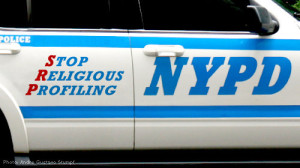 The New York Police Department (NYPD)’s program of widespread spying on Muslims is currently on trial in a federal courtroom in Manhattan. Civil rights lawyers from the American Civil Liberties Union, the CLEAR project of CUNY School of Law and the New York Civil LIberties Union are representing Muslim organizations and individuals in New York City who argue their constitutional rights have been violated. A separate challenge argues that the NYPD’s Muslim spying program violates previously agreed restrictions on the policing of political activity.
The New York Police Department (NYPD)’s program of widespread spying on Muslims is currently on trial in a federal courtroom in Manhattan. Civil rights lawyers from the American Civil Liberties Union, the CLEAR project of CUNY School of Law and the New York Civil LIberties Union are representing Muslim organizations and individuals in New York City who argue their constitutional rights have been violated. A separate challenge argues that the NYPD’s Muslim spying program violates previously agreed restrictions on the policing of political activity.
Ironically, the NYPD’s attempt to provide a legal defense of its activities implicitly acknowledges the very dangers critics have pointed to. Sections of its defense brief assume that a violent act anywhere in the world that happens to be carried out by a Muslim provide a sufficient basis for surveilling the political opinions of Muslims in New York City – an argument that effectively enables policies of religious profiling.
An Associated Press (AP) investigation first published in 2011 revealed that the NYPD’s surveillance program involves placing informants and undercover cops in mosques, Muslim Student Associations, Muslim and Arab community organizations, and cafes, bookshops, and restaurants where Muslims are thought to congregate. 263 locations across the city were identified as “ethnic hot spots.” The documents obtained by the AP demonstrate the NYPD keeps files on the political and religious opinions expressed by Muslims in these various settings. For example, in 2006, NYPD informants recorded conversations by Muslims about the Mohammed cartoons published by the Danish newspaper Jyllands-Posten.
The key issue in the cases is whether NYPD surveillance is rooted in specific evidence of criminal activity, or whether it ranges beyond any basis in reasonable suspicion to criminalize activities that are protected under the first amendment – such as political speech and religious practices. The so-called Handschu guidelines – agreed in 1985 following revelations in the 1970s of infiltration and surveillance of law-abiding political groups – regulate how the NYPD polices political activities. The guidelines were loosened following 9/11 but in their modified form still require the NYPD to not investigate political activity unless there is a “reasonable indication” that unlawful acts have occurred or will take place. A lesser form of investigation, known as a “preliminary inquiry,” requires there be “an allegation or information indicating the possibility of unlawful activity.”
The NYPD’s response to the allegations has been twofold. First, it has issued a letter that smears the imams, mosques, and Muslim charities bringing the case. Without any solid evidence, the letter alleges that they are linked to terrorism. Much of the letter relies on guilt by association and innuendo. Vague phrases such as “ties to terrorism” are used to insinuate that surveillance of these individuals and organizations is warranted. Second, the NYPD has claimed in court that there is no general program that subjects Muslims to surveillance for being Muslim, just a series of individual investigations, which are rooted in a “reasonable indication” of criminal activity.
New Yorkers would do well to read pages 14 and 15 of an NYPD brief that outlines its defense of collecting political statements made by Muslims about the Jyllands-Posten cartoons. The NYPD states:
The Danish Cartoon Reporting was conducted as the result of strong negative and sometimes violent reaction by Muslims worldwide to the publication of cartoons depicting the Prophet Muhammad by a Danish newspaper.
The cartoons were shot through with Islamophobic stereotypes and were published by the newspaper’s neoconservative editors in order to depict Muslims as violent and intolerant. Across Europe, demonstrations were organized to protest against them. In the Middle East, some demonstrations against the cartoons escalated into acts of violence, directed as much against the repressive practices of regional governments as against the cartoons themselves. But these were not the actions of terrorist groups, let alone terrorist groups known to have a presence in the US. The NYPD’s surveillance had nothing to do with any organized threat. Its logic was rather that a violent act anywhere in the world that happened to be carried out by a Muslim was a sufficient basis for the NYPD to carry out surveillance of the political opinions of Muslims in New York City.
Given that there are over a billion Muslims in the world, in any month some will be involved in potentially violent protests, just as much as any other large global population. But to judge the behavior of Muslims in New York by what a tiny number do in a completely different part of the world amounts to religious profiling. If the NYPD’s logic is accepted, an event in Egypt, Syria, or Pakistan can always be found to justify surveillance of Muslims in New York.
Oddly, the NYPD cites this argument to argue that its program does not amount to indiscriminate spying on Muslims. Yet its very defense illustrates its discriminatory logic and its failure to ground its investigations in any reasonable suspicion of specific criminal acts.
If the courts find there is nothing wrong with this approach to policing, it will be a sad result not just for Muslims in New York but for anyone concerned about our diminishing civil liberties.


